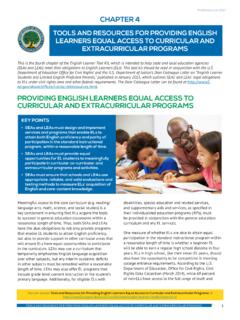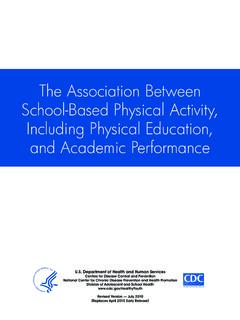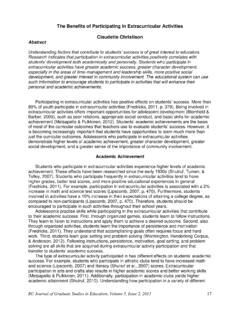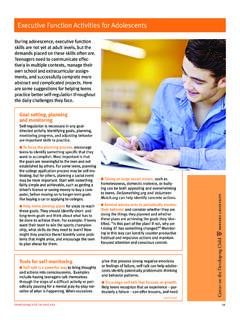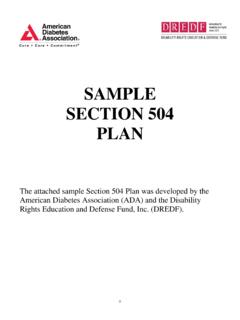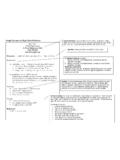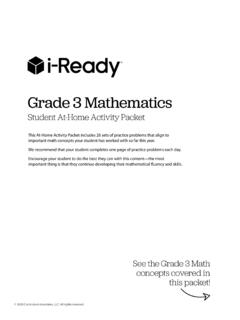Transcription of An Unequal Playing Field - GOV.UK
1 extra - curricular activities , Soft Skills and Social MobilityAn Unequal Playing Field :Michael Donnelly, Predrag La eti , Andres Sandoval-Hernandez, Kalyan Kumar and Sam WhewallDepartment of Education and Institute for Policy Research, University of BathCONTENTS1 Foreword2 Executive Summary5 Section 1: Introduction6 Research aims and context6 Research questions7 Policy context8 Methodology8 Secondary data9 Qualitative research11 Report outline12 Section 2: extra - curricular activities : Significance and Gaps in Participation14 Introduction14 The importance of extra - curricular activities14 Education, soft skills and wellbeing15 Educational aspirations and achievement: new analysis of Understanding Society and PISA20 How do young people interpret the value of extra - curricular activities ?
2 23 Gaps in opportunities to participate in extra - curricular activities23 Previous research26 Evidence on participation gaps50 Section 3: The Labour Market, Soft Skills and Social Mobility52 Introduction53 Soft skills: definitions and concepts54 Which soft skills do employers want?54 Skill shortages55 Skill gaps58 Critique of employer perspectives58 Soft skills and social mobility61 Section 4: Conclusions and Recommendations64 Recommendations for policy65 Recommendations for practice66 References73 AppendixAbout the Social Mobility Commission The Social Mobility Commission is an advisory non-departmental public body established under the Life Chances Act 2010 as modified by the Welfare Reform and Work Act 2016. It has a duty to assess progress in improving social mobility in the UK and to promote social mobility in England.
3 Dame Martina Milburn (Chair) Alastair da Costa, Chair of Capital City College Group Farrah Storr, Editor-in-chief, Elle Harvey Matthewson, Aviation Activity Officer at Aerobility and Volunteer Jess Oghenegweke, Broadcast and Digital Coordinator at The Roundhouse Jody Walker, Senior Vice President, TJX Europe (TK Maxx and Home Sense in the UK) Liz Williams, Group Director of Digital Society at BTCommissionersCreative Direction & Design by Sabroso Studio Pippa Dunn, Founder of Broody, helping entrepreneurs and start ups Saeed Atcha, Founder and Chief Executive Officer of Xplode Magazine Sam Friedman, Associate Professor in Sociology at London School of Economics Sammy Wright, Vice Principal of Southmoor Academy, Sunderland Sandra Wallace, Joint Managing Partner Director Europe at DLA Piper Steven Cooper, Chief Executive at & Co.
4 Social Mobility Commission | 1 One of the best bits about childhood is doing the things you enjoy outside the classroom joining a football team, learning to dance or Playing the drums. Yet our research shows too many young people from disadvantaged backgrounds never get the chance. As a result, they lose out on the benefits increased confidence which helps social interaction, a real aspiration to go onto higher or further education, more soft skills and a sense of wellbeing and belonging. Playing team sports, doing voluntary work, joining a youth club or singing in a band are also vital in developing networks which those from affluent backgrounds often have ready-made. An Unequal Playing Field found that the school you go to, the area where you grow up, and your socioeconomic background largely determine what types of activities are available outside the classroom.
5 There was a direct link between household income and participation for almost all extra - curricular activities which were included in the survey. Children from the poorest households were much less likely to take part in any extra - curricular activity, but particularly music and sport. As a Commission we want to promote choice, but here we have uncovered barriers which prevent choice. In some places it is a straightforward lack of opportunities. Some activities , common in some areas, are simply not available in others. There are financial barriers too - children from the poorest backgrounds are also often priced out of participation. Sometimes young people do not participate because they just do not know that they can. And perhaps most revealing of all, some young people do not take part in activities because of their perceived exclusivity.
6 They do not think they would fit in. We have a responsibility to change this. As a start we propose a national extra - curricular bursary scheme for disadvantaged households to help them access a far greater range of activities . We also call for more support to extend voluntary sector initiatives for children from less affluent our report shows that a young person may miss out on some of the most valuable experiences in life a chance to bond with others, aspire to learn more, and gain the soft skills so important to employers simply because of their social background and where they grew up. It is time to level the Playing Martina Milburn Chair, Social Mobility CommissionFOREWORD2 | Social Mobility Commission The breadth of extra - curricular activities , spanning the musical, artistic, social and sporting domains, are widely considered valuable life experiences that should be open to all young people, regardless of background or where they happen to live.
7 activities such as being a member of a sports team, learning a musical instrument, or attending a local youth group are thought to be enriching life experiences. Apart from their inherent value, it is often claimed that young people can also develop positive tangible outcomes from these experiences of interacting and working with others through organised extra - curricular activities , which could benefit them in later report considers the significance of extra - curricular activities within contemporary debates around social mobility. It focusses on secondary aged school children and assesses available evidence on the possible impact of extra - curricular activities across a range of outcomes as well as current gaps in opportunities to participate in different activities .
8 These questions are considered in the context of broader debates around the importance of soft skills within the UK labour market. We bring together and analyse a range of data from both secondary and primary sources. This includes bringing together previous research, analysis of three nationally representative secondary data-sets, as well as primary data collected from over 100 young people and parents across four different English localities. These data-sets provide a unique opportunity to understand both national level patterns (quantifying gaps in participation) as well as detailed explanations for what might be driving them (qualifying and explaining barriers to participation). They provide the basis for a comprehensive set of recommendations that are put forward here aimed at expanding opportunities to participate in extra - curricular activities .
9 The four key findings from our analysis, and four crucial recommendations for policy and practice, are summarised SUMMARYE xtra- curricular activities are important to young people and result in a range of positive outcomesOpportunities to take part in extra - curricular activities are unequally from previous research suggest extra - curricular activities are important in developing soft (especially social) skills as well as being associated with a range of other positive outcomes ( achievement, attendance at school). We found from our analysis that extra - curricular activities - specifically music classes and Playing a wide range of sports are important in predicting intentions to remain in education after compulsory schooling.
10 Regardless of these instrumental outcomes, extra - curricular activities were hugely valuable to young people themselves in ways that are not quantifiable. extra - curricular activities boost young people s confidence to interact socially with others; extend their social networks; and provide them with new skills and abilities. Above all, they offer an important space to have fun and relax away from the pressures of school work. These more qualitative benefits must not be discounted, especially in the context of contemporary challenges around young people s mental health and parts of life experience gained from extra - curricular activities are unavailable for the most marginalised groups in society. Opportunities to participate are driven by household income, school attended, gender, ethnicity and geographic location.










